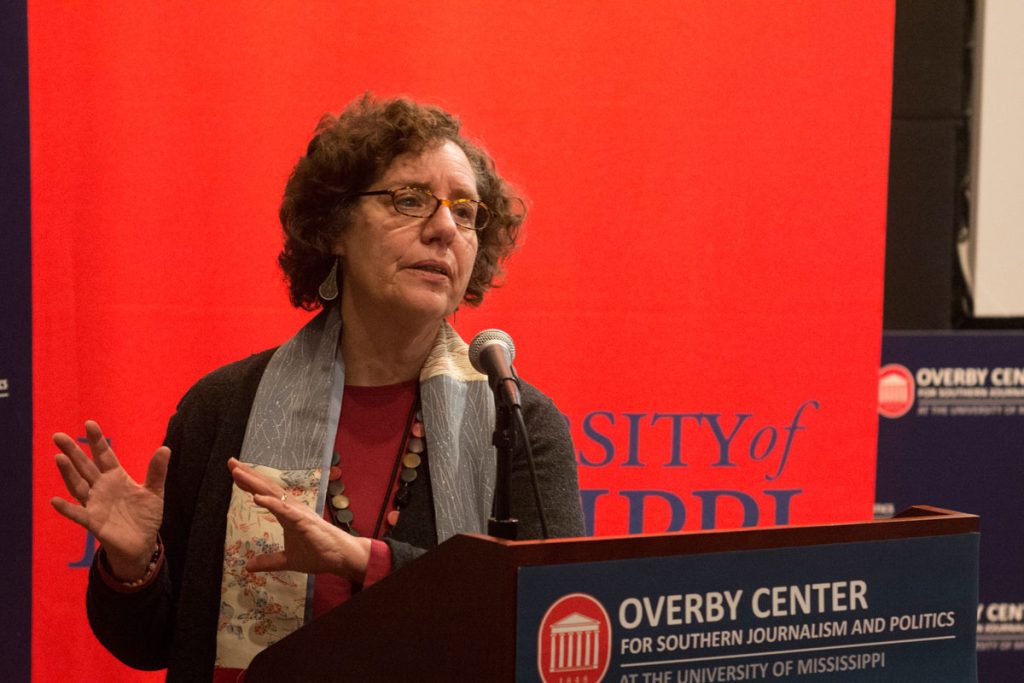Thursday afternoon, writer and journalist Elaine Weiss delivered a speech on her newly released book “The Woman’s Hour: The Great Fight to Win the Vote,” which highlights the battle for women’s suffrage as a pivotal point in American history. The event was held as part of both the Oxford Conference for the Book and Women’s History Month, sponsored by the Sarah Isom Center for Women and Gender Studies.
“I could tell the story had not been told in full, in a popular way, and we just don’t know this part of our history,” Weiss said. “We don’t know how American women became full citizens, and I think it’s something we should know about.”
During her lecture in the Overby Center, she shared the stage with assistant professor of history and Southern studies Jessica Wilkerson, who asked about Weiss’ writing process. The duo talked through how Weiss came to make characters out of the different historical figures in her book, as well as exploring different aspects of the fight for suffrage.
“There were moments that I wish I was able to write fiction,” Weiss said. “It would have been fun, but all of what you can read as character development or what they were feeling is really based on documents.”

Elaine Weiss discusses the suffrage battle at the Overby Auditorium for the Oxford Conference for the Book on Thursday. Photo by Ariel Cobbert
Weiss also discussed some of the lesser-known effects of the suffrage movement on modern civil rights movements.
“The later 20th century civil rights movements – and that’s racial rights and gay rights and a lot of other civil right groups – used a lot of the techniques of the suffrages,” Weiss said. “Like marching. Picketing had not been done. Picketing the White House, a bunch of very sophisticated lobbying techniques. Using test cases to go through the court.”
Her book focuses on the women’s suffrage movement in Nashville, but it aims to put bring perspective to the movement’s widespread impact on the country as a whole.
“This book is certainly about how women fought to gain political equality, but it is also about the men around them,” Weiss said. “The politicians, the legislatures, the men who support them and who are against them.”
In her closing remarks, Weiss offered words of wisdom to the audience.
“America actually has always had a very conflicting idea of what democracy is,” Weiss said. “We exposed it. It’s our motto. We fight wars about it. We take great pride in it, but when it comes down to it, it’s never been an idea that universal suffrage was guaranteed.”
She cited methods used to intimidate voters in recent elections in her speech.
“Now we see all those attempts to intimidate voters,” Weiss said. “To make it harder to vote. To suppress voters. To say there is voter fraud when there is no evidence to show that. All of this is again our ambivalence of democracy. Who has a voice? Who gets to decide the faith of our nation?”
Weiss also emphasized the idea that the fight for suffrage is still happening.
“The fight for suffrage, not just women’s suffrage, but suffrage American voting is ongoing and we have to protect that vote for every citizen.” Weiss said.
Wilkerson said she was happy the university chose Weiss to speak about women’s suffrage. She said Weiss’ story helps to remember that gender equality is an ongoing and hard-fought process where nothing is inevitable.
“It’s really important for us, as an institution, to highlight the work of women scholars and women writers, and she is a really high-profile one,” Wilkerson said. “That makes a statement as an institution that we care about women’s history.”






